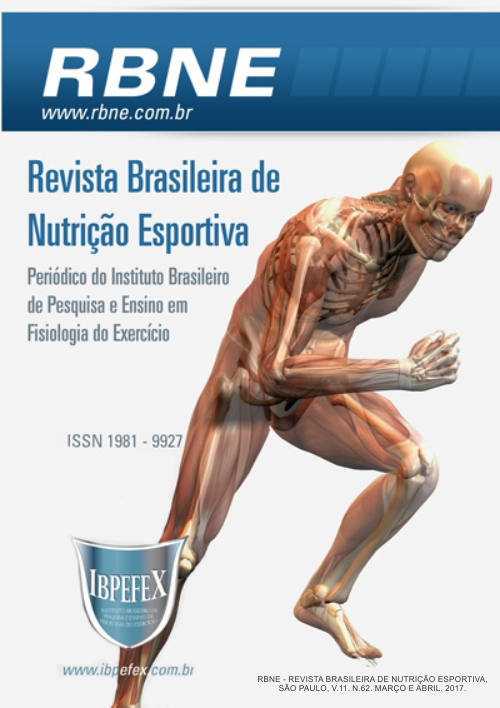Effect of carbohydrate intake on physical performance during cycling indoor workout
Abstract
Cycling indoor is a rhythmic and cyclical exercise that promotes metabolic, muscle and cardiorespiratory adaptations. The training mode can increase energy demand to a point that requires the metabolism of carbohydrates. The aim of this study was to observe the effects of the carbohydrates sharp intake on performance in a cycling indoor workout. This study was conducted in a double-blind, cross-over, randomized model. Attended seven recreational male cyclists, aged 36.28 ± 4.33 years, weight 77 ± 8.86 kg. During two similar cycling indoor workout, lasting 80 minutes, participants ingested drinks placebo (PLA) or supplemented (SUP) with dextrose (0.7 g / kg), offered in three stages: 10 minutes before the start, 25 and 50 minutes of exercise. Blood glucose was measured 10 minutes before, at the beginning, in the minutes 35 and 60 and the workout end. Immediately after exercise end, was measured the glucose level, total distance, revolutions per minute (RPM), average power, heart rate and perceived exertion (0-10). The blood glucose was higher in the SUP group at the beginning and at 60 and 80 minutes of workout. The RPM were lower in the SUP group while the other variables were not different. It is concluded that supplementation with dextrose was effective in increasing blood glucose levels, however, this did not influence the physical performance in cycling indoor workout.
References
-Andrews, J. L.; Sedlock, D. A.; Flynn, M. G.; Navalta, J. W.; Ji, H. Carbohydrate loading and supplementation in endurance-trained women runners. Journal of Applied Physiology. Vol. 95. Num. 2. 2003. p. 584-590.
-Arkinstall, M. J.; Bruce, C. R.; Nikolopoulos, V. Effect of carbohydrate ingestion on metabolism during running and cycling.Journal of Applied Physiology. Vol. 91. 2001. p. 2125-2134.
-Bacurau, F.R. Nutrição e suplementação esportiva. Guarulhos: Phorte, 2001.
-Borg, G. Psychophysical scaling with applications in physical work and the perception of exertion. Scandinavian Journal of Work, Environment and Health.1990. p. 55-58.
-De Mello, D. B.; Dantas, E. H. M.; Da Silva Novaes, J.; De Albergaria, M. B. Alterações fisiológicas no ciclismo indoor. Fitness and Performance Journal, Vol. 2. Num. 1. 2003. p. 30-40.
-El Sayed, M. S.; Rattu, A. J. M.; Roberts, I. Effects of carbohydrate feeding before and during prolonged exercise on subsequent maximal exercise performance capacity. International Journal of Sports Nutrition. Vol. 5. Num. 1. 1995. p. 215-224.
-Guerra, I. Importância da alimentação do atleta visando a melhora da performance. Nutrição em Pauta, Vol. 55, Num. 1. 2002. p. 63-66.
-Jeukendrup, A. E. Carbohydrate intake during exercise and performance. Nutrition, Vol. 20. Num. 7. 2004. p. 669-677.
-Jeukendrup, A. E.; Wagenmakers, A. J.; Stegen, J. H.; Gijsen, A. P.; Brouns, F.; Saris, W. H. Carbohydrate ingestion can completely suppress endogenous glucose production during exercise. American Journal of Physiology-Endocrinology and Metabolism. Vol. 276. Num. 4. 1999. p. 672-683.
-Kjær, M. l. Hepatic glucose production during exercise. In: Skeletal Muscle Metabolism in Exercise and Diabetes. Vol. 441. Num. 1. 1998. p. 117-127.
-Martins, R. M.; Ferreira, M. A.; Araújo, H. D. S.; Navarro, F.; Liberali, R. Nível de desidratação durante uma aula de ciclismo indoor. RBNE-Revista Brasileira de Nutrição Esportiva. Vol. 1. Num. 3. 2007. p. 91-104. Disponível em: <http://www.rbne.com.br/index.php/rbne/article/view/30/29>
-McConell, G.;Snow, R. J.;Proietto, J.;Hargreaves, M. Muscle metabolism during prolonged exercise in humans: influence of carbohydrate availability. Journal of Applied Physiology. Vol. 87. Num. 3. 1999. p. 1083-1086.
-Meneghelli, L. A.; Vilela, F. L.; Navarro, F. Comparação das respostas hemodinâmicas durante uma aula de ciclismo indoor. Revista Brasileira de Prescrição e Fisiologia do Exercício. Vol. 1. Num. 5. 2011. p. 57-61. Disponível em: <http://www.rbpfex.com.br/index.php/rbpfex/article/view/48/47>
-Thomas, D. T.; Erdman, K. A.; Burke, L. M. American College of Sports Medicine Joint Position Statement. Nutrition and Athletic Performance. Medicine and science in sports and exercise.Vol. 48. Num. 3.2016. p.543.
-Tsintzas, O. K., Williams, C. L. Y. D. E., Wilson, W. E. N. D. Y., Burrin, J. A. C. K. I. E. Influence of carbohydrate supplementation early in exercise on endurance running capacity. Medicine and science in sports and exercise, Vol. 28. Num. 11. 1996. p. 1373-1379.
-Valle, V. S. Efeito de doze semanas de treinamento de ciclismo indoor sobre a composição corporal e nível sérico lipídico de mulheres adultas com sobrepeso; Revista Brasileira de Cineantropometria e Movimento. Vol. 20. Num. 1. 2012. p. 34-40.
-Williams, C.; Devlin, J. T. Foods, nutrition and sports performance. Londres: E & FN SPON, 1994.
Authors who publish in this journal agree to the following terms:
- Authors retain the copyright and grant the journal the right of first publication, with work simultaneously licensed under the Creative Commons Attribution License BY-NC which allows the sharing of the work with acknowledgment of the authorship of the work and initial publication in this journal.
- Authors are authorized to enter into additional contracts separately for non-exclusive distribution of the version of the work published in this journal (eg, publishing in institutional repository or book chapter), with acknowledgment of authorship and initial publication in this journal.
- Authors are allowed and encouraged to post and distribute their work online (eg, in institutional repositories or on their personal page) at any point before or during the editorial process, as this can bring about productive change as well as increase impact and impact. citation of published work (See The Effect of Free Access).






